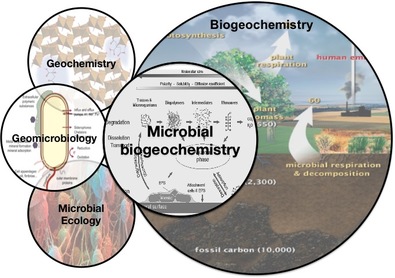The Goal: Understanding how soils respond and adapt to climate and land use change
Our research broadly focuses on the response of soils to climate and land use change. The main goal of our research is to understand the effect of changing environmental conditions on fundamental biogeochemical mechanisms that control the fate of essential elements, most importantly the cycling and storage of carbon, within terrestrial ecosystems. This fundamental knowledge helps improve predictions of future change and informations land management decisions.
The Problem: Soil carbon responds to and drives climate change

Soil plays a critical role in global carbon cycling, having a dynamic carbon stock in the form of soil organic carbon (SOC) that is three-times larger than the amount stored in the atmosphere. Increases in microbial mineralization of SOC could alter the soil C balance and undermine these massive C stocks. Because loss of SOC from soils releases additional CO2 into the atmosphere and diminishes a soil’s fertility, there is a broad debate how microbial SOC mineralization will respond to future climate change impacts.
The Science: What is (microbial) biogeochemistry?

“Microbial biogeochemistry is the study of microbially influenced geochemical reactions, enzymatically catalyzed or not, and their kinetics. These reactions are often studied in the cycling of inorganic and organic matter, with emphasis on environmental mass transfer and energy flow” (Ehrlich’s Geomicrobiology, 2015).
Our research integrates soil science with modern microbiology, ecology, and geochemistry approaches to address questions concerning the impacts of climate and land use change on biogeochemical reactions in soils.
The Approach: Identifying micro-scale mechanisms underlying ecosystem-scale processes
To assess the impact of molecular-scale biogeochemical reactions in soils on ecosystem-scale processes, we combine lab and field measurements of reactions within soil microhabitats (e.g., the rhizosphere, the litter layer, or aggregates) with monitoring of ecosystem-scale fluxes within the whole plant-soil system.
